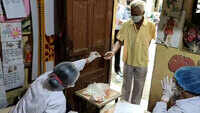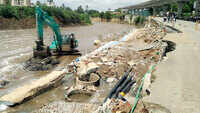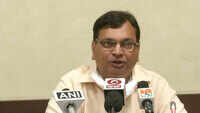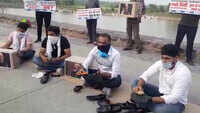
Mysuru: Amid a raging debate over the merits of online classes for schoolchildren during the Covid-19 crisis, chairman of the Karnataka State Commission for Protection of Child Rights Anthony Sebastian has thrown into stark relief the lack of even the most basic items for kids in tribal hamlets in Mysuru and Kodagu districts. Sebastian, along with ML Parashuram, a member of the commission, visited tribal hamlets in Kaarakandi, Nagarahole Gaddadi, Devamachi, Thithimathi, Anemala, Machchuru and Bhavali in the two districts, and found that the lockdown had deprived the children in these far-flung areas of nutritious food and education.
“I visited tribal hamlets in the two districts in mid-June and interacted with the children directly so as to learn how they had been affected during the lockdown. Most of the kids informed me that they had been unable to attend schools. To them, virtual classes is something alien. They have not had access to smartphones and other gadgets. Their education has largely been confined to the classrooms,” Parashuram told TOI.
In the report he has submitted to the state government, Parashuram has highlighted the futility of rolling out online classes when children in the haadis are not in the least familiar with the functioning of advanced electronic gadgets. “Children in the tribal hamlets appear not to have figured in the plans drawn up by the stakeholders while deciding on rolling out online classes. Moreover, virtual classes come with their own set of problems, which include damage to health owing to the long hours that children have to sit in front of an electronic screen,” he added.
The report goes on to add that, following the enforcement of the lockdown, anganwadis in the hamlets and their neighbourhood, were not functioning regularly thereby depriving the children of nutritious food they would otherwise have had access to.
Mysuru district coordinator with the commission Deekshith said that there were around 202 children in the tribal hamlets in the two adjoining districts who were enrolled in schools and anganwadis who had suffered owing to the lack of sufficient food for the past three months.
“I visited tribal hamlets in the two districts in mid-June and interacted with the children directly so as to learn how they had been affected during the lockdown. Most of the kids informed me that they had been unable to attend schools. To them, virtual classes is something alien. They have not had access to smartphones and other gadgets. Their education has largely been confined to the classrooms,” Parashuram told TOI.
In the report he has submitted to the state government, Parashuram has highlighted the futility of rolling out online classes when children in the haadis are not in the least familiar with the functioning of advanced electronic gadgets. “Children in the tribal hamlets appear not to have figured in the plans drawn up by the stakeholders while deciding on rolling out online classes. Moreover, virtual classes come with their own set of problems, which include damage to health owing to the long hours that children have to sit in front of an electronic screen,” he added.
The report goes on to add that, following the enforcement of the lockdown, anganwadis in the hamlets and their neighbourhood, were not functioning regularly thereby depriving the children of nutritious food they would otherwise have had access to.
Mysuru district coordinator with the commission Deekshith said that there were around 202 children in the tribal hamlets in the two adjoining districts who were enrolled in schools and anganwadis who had suffered owing to the lack of sufficient food for the past three months.
Quick Links
Kerala Coronavirus Helpline NumberHaryana Coronavirus Helpline NumberUP Coronavirus Helpline NumberBareilly NewsBhopal NewsCoronavirus in DelhiCoronavirus in HyderabadCoronavirus in IndiaCoronavirus symptomsCoronavirusRajasthan Coronavirus Helpline NumberAditya ThackerayShiv SenaFire in MumbaiAP Coronavirus Helpline NumberArvind KejriwalJammu Kashmir Coronavirus Helpline NumberSrinagar encounter
Get the app








